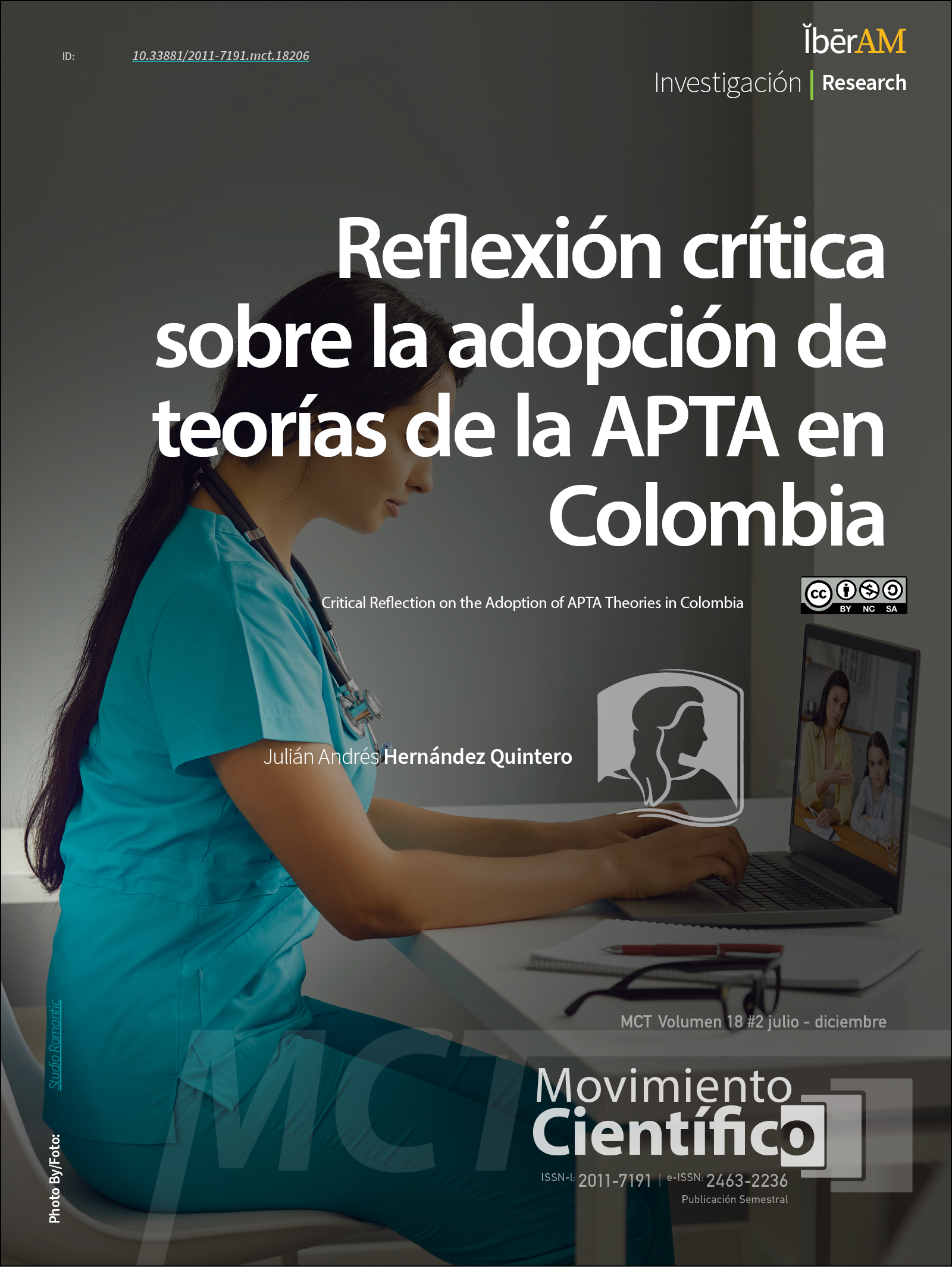Reflexión crítica sobre la adopción de teorías de la APTA en Colombia
Critical reflection on the adoption of APTA theories in Colombia
Contenido principal del artículo
Este estudio examina la pertinencia de adoptar las teorías de la American Physical Therapy Association (APTA) en Colombia, teniendo en cuenta las diferencias en los contextos socioeconómico y de salud entre ambos países. A través de una revisión de la literatura, se analizaron 20 artículos que exploran la influencia de la APTA y las particularidades del sistema de salud colombiano. Los resultados revelan que las teorías de la APTA, diseñadas para un entorno altamente tecnificado, no siempre se ajustan a las condiciones de Colombia, donde la distribución de recursos es desigual y el acceso a tecnologías avanzadas es limitado. Se subraya la necesidad de desarrollar teorías propias en Colombia para asegurar una práctica de la fisioterapia más efectiva y contextualizada, evitando la dependencia intelectual y promoviendo la innovación local. Finalmente, se concluye que la creación de un marco teórico basado en la investigación local es esencial para una fisioterapia autónoma, relevante y sostenible en el contexto colombiano.
Descargas
Datos de publicación
Perfil evaluadores/as N/D
Declaraciones de autoría
Indexado en
-
—
- Sociedad académica
- N/D
- Editorial
- Bogotá: Corporación Universitaria Iberoamericana
Detalles del artículo
Audette, J. (2017). Trends in global health: Improving health equity through physical therapy and rehabilitation. Health Volunteers Overseas. Retrieved from https://hvousa.org/what-we-do/publications/trends-in-global-health-improving-health-equity-through-physical-therapy-and-rehabilitation
Brennan, G., & Fritz, J. M. (2016). Examining the evidence for value-based physical therapy: Is it time to adopt a new health services research agenda? Physical Therapy, 96(7), 1020-1024. https://doi.org/10.2522/ptj.20150413
Crump, J. A., & Sugarman, J. (2021). Ethical considerations for physical therapists practicing outside their scope in low- and middle-income countries. Journal of Bioethical Inquiry, 18(3), 300-315. https://doi.org/10.1007/s11673-021-10004-z
Dean, E. (2011). Adopting population health frameworks in physical therapist practice research and education: The urgency of now. Physical Therapy, 101(10), pzab158. https://doi.org/10.1093/ptj/pzab158
Dholakia, K., & Willgens, A. (2021). Uncovering ethical dilemmas in international service-learning: A grounded theory. Journal of Physical Therapy Education, 35(2), 128–137. https://doi.org/10.1097/JTE.0000000000000182 DOI: https://doi.org/10.1097/JTE.0000000000000179
Freburger, J. K., Holmes, G. M., & Carey, T. S. (2011). Comparing patient characteristics and treatment processes in patients receiving physical therapy in the United States, Israel, and the Netherlands: Cross-sectional analyses of data from three clinical databases. BMC Health Services Research, 11(76), 1-9. https://doi.org/10.1186/1472-6963-11-76 DOI: https://doi.org/10.1186/1472-6963-11-76
Glickman, L., Olsen, J., & Rowthorn, V. (2015). Measuring the cross-cultural adaptability of a graduate student team from a global immersion experience. Journal of Cultural Diversity, 22(4), 148. DOI: https://doi.org/10.1016/j.physio.2015.03.3241
Greenfield, B., & Jensen, G. M. (2021). Theory-Informed Clinical Practice: How Physical Therapists Can Use Theoretical Frameworks to Guide Clinical Decision Making. Physical Therapy, 101(10), pzab158. https://doi.org/10.1093/ptj/pzab158 DOI: https://doi.org/10.1093/ptj/pzab158
Jones, M. A., & Dean, E. (2011). A vision for society: Physical therapy as partners in the national health service delivery system. Physical Therapy, 91(11), 1664-1674. https://doi.org/10.2522/ptj.20110148 DOI: https://doi.org/10.2522/ptj.20100347
Kumar, S. (2021). Navigating Citizenship in the Harbour City: Sexuality, ethnicity and belonging among Lebanese, Indian, and Anglo LGBTQ+ young adults in Sydney, Australia (Doctoral dissertation, UNSW Sydney).
Leigh, J. P., & To, T. (2012). Advancing physical therapy practice to improve global health: Perspectives from low- and middle-income countries. Physical Therapy, 92(12), 1625-1634. https://doi.org/10.2522/ptj.20120079 DOI: https://doi.org/10.2522/ptj.20120079
Lin, C.-L., Ye, Y., & Lin, P. (2021). Safe sexual behavior intentions among college students: The construction of an extended theory of planned behavior. International Journal of Environmental Research and Public Health, 18(5), 6349. https://doi.org/10.3390/ijerph18056349 DOI: https://doi.org/10.3390/ijerph18126349
Nicolini, D. (2012). Practice theory, work, and organization: An introduction. Oxford University Press.
Noor, M. N., Holt, M., & Qureshi, A. (2021). Sexual risk-taking among homeless young people in Pakistan. Health and Social Care in the Community, 29(5), 1550-1558. https://doi.org/10.1111/hsc.13169 DOI: https://doi.org/10.1111/hsc.13220
Schreiber, J., Goodgold, S., Moerchen, V., & Bennett, S. (2013). Defining, agreeing on, and testing an international physical therapy core data set: Results of a feasibility study involving seven countries. Physical Therapy, 93(4), 449-462. https://doi.org/10.2522/ptj.20120238
SpringerLink. (2021). Theories of practice and global public health. In Promoting physical therapists’ integration of research evidence to inform clinical practice: A global perspective (pp. 16-39). Springer. https://doi.org/10.1007/978-3-030-62815-3_16
Van der Zee, J., Baart de la Faille-Deutekom, M., & Post, M. W. (2014). The influence of health system context on outcomes of physical therapy: A cross-sectional comparison between the United States, Israel, and the Netherlands. BMC Health Services Research, 14(103), 1-9. https://doi.org/10.1186/1472-6963-14-103 DOI: https://doi.org/10.1186/1472-6963-14-103
World Physiotherapy. (2018). Profile of the profession: Global snapshot of physical therapy practice. World Physiotherapy. Retrieved from https://world.physio/resources
World Physiotherapy. (2019). Survey reveals global state of the physical therapy profession. World Physiotherapy. Retrieved from https://world.physio/resources















